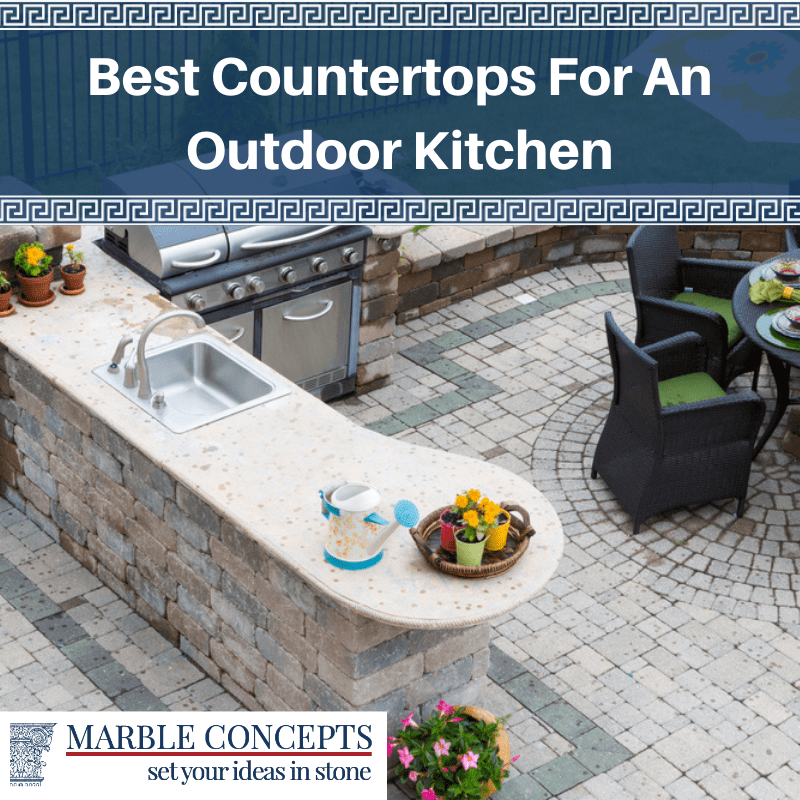Outdoor kitchens are growing in popularity, providing you and your family with an area outside your home to enjoy delicious meals prepared in the fresh air. Today, many homeowners are installing full kitchens with ovens, stoves, and refrigerators while others are simply creating the perfect barbecue space. Whether you want a full kitchen on your patio, a barbecue expert, or are simply adding a nice outdoor bar, you will need to choose the right countertops for the area. Marble Concepts offers these pros and cons for some of the most popular outdoor kitchen countertop options.
Concrete
If you’re looking for something truly unique, consider a concrete countertop. They are very durable and can be molded to fit any outdoor design. Because concrete gives a minimalist look, they are perfect for the natural look in an outdoor kitchen. Concrete must be sealed often to resist stains, mildew, and mold. Concrete is also susceptible to discoloration in direct sunlight, so it is recommended for shady areas. It can also absorb liquids more easily than other types of stone. Concrete can be expensive, but costs, on average, about the same as granite.
Dekton
Dekton countertops are created from porcelain, glass, and quartz, creating a strong material that can handle widely fluctuating temperatures. Dekton is strong enough to resist knife cuts, is UV resistant so the sun will not cause discoloration.
Granite
There is no question that granite is one of the most popular options for countertops as they are extremely durable and heat resistant. If you choose a higher-grade granite, you may only need to have them sealed once by a granite company nearby to prevent mold, mildew, and stains on your outdoor kitchen counter. In addition, granite comes in many colors and veining options, so you are likely to find something that goes with the theme of your outdoor area. Keep in mind that if you choose a lower-grade granite, you will need to have it sealed more often. They can also be more expensive than other types of stone.
Laminate
It is not recommended that you use laminate in an outdoor kitchen. Laminate is extremely susceptible to moisture as the decorative part of the counter is simply sealed to fiberboard underneath. Although laminate is one of the least expensive countertop options, it will not withstand moisture or extreme fluctuations in temperature.
Quartzite
Very similar to the same quartz counters you can get for your indoor kitchen, quartzite is much harder, even harder than granite. The stone often resembles marble, and it is heat resistant. You can find quartzite in bright colors created by iron oxide as well as subdued gray. However, quartzite must be cut to fit using diamond blades which makes it fairly expensive. It also must be sealed twice each year to protect the surface from the elements. Despite its hardness, quartzite scratches fairly easily. Which means you should only use soft cleaning supplies on the surface.
Slate
Slate is a very popular option for outdoor kitchens, giving the space a rustic, unfinished look. According to granite companies nearby, slate is extremely heat resistant and is suitable even in direct sunlight. Choose a denser slab to avoid staining. Slate also only needs to be sealed once to remain protected. However, if you choose a less dense slab of slate, you may find that it is more porous, and this type of countertop will need to be sealed annually. Slate is softer than other stones which means it may scratch or chip more easily. However, sandpaper can often remove small scratches and dents from slate.
Soapstone
If you are looking for a counter that does not need sealing at all, consider soapstone. It easily resists stains and mold, plus it is very low maintenance, requiring nothing more than mild dish soap to clean it. Keep in mind that soapstone is a fairly soft stone and it can be damaged by knives, dropping objects, or putting something too hot on the surface. As spills occur, the color of soapstone can darken, so it is critical to wipe spells up quickly. Mineral oil can easily bring back the luster of soapstone.
Tile
Stone tiles are another great option for an outdoor kitchen. Depending on which stone the tiles are created from, you could have a counter that is extremely durable and able to withstand any type of weather. There are many varieties of tile to choose from, making it very versatile and it is often less costly than slabs of natural stone. Keep in mind that tile means you will have grout and grout is very porous. It will attract dirt and grime more easily plus it can be difficult to clean. If you do choose tile, you may want to put it in an area where leaves, dirt, and dust cannot settle on the surface easily or you may need to clean the grout quite often.
Sizing your Counter
The other thing to keep in mind when choosing a stone for your outdoor counter is that it should provide you with enough surface area to actually work like your indoor kitchen. A counter should be at least 24 inches, but if you have a stove or refrigerator, you may need to go a little wider. You can customize the height of your counter based on your needs. Most outdoor counter heights are around 36 inches, but you can raise or lower yours to fit what works for you.
If you are considering an outdoor kitchen, contact Marble Concepts today to see how we can help. With a wide variety of stone options, you are sure to find one that will fit perfectly in your outdoor space. Our team can guide you through the process and help you choose the perfect countertop for you and your family. Give us a call at 215-396-7393 or fill out the easy online form today.






